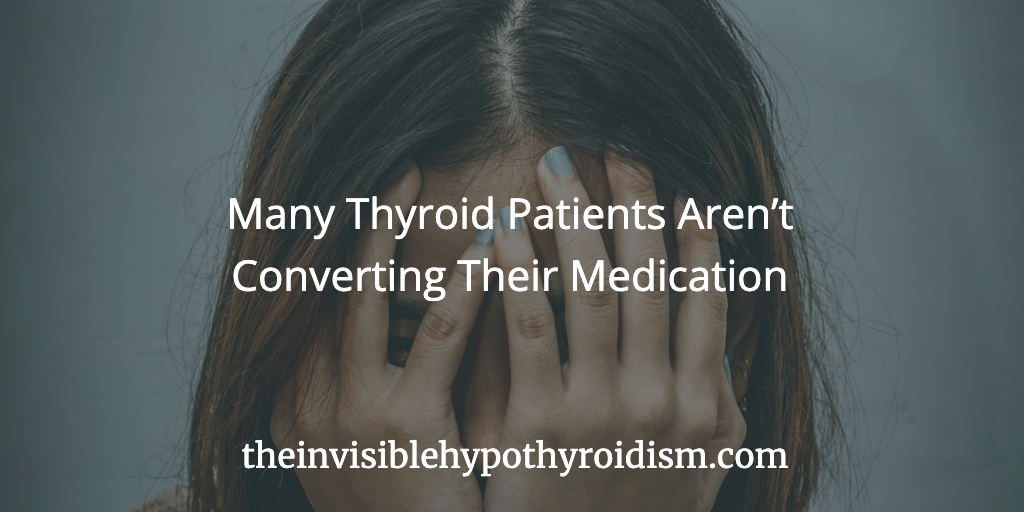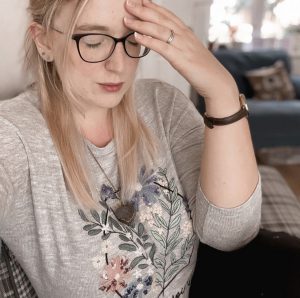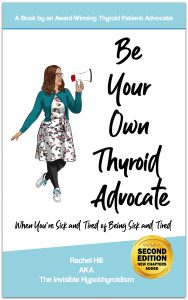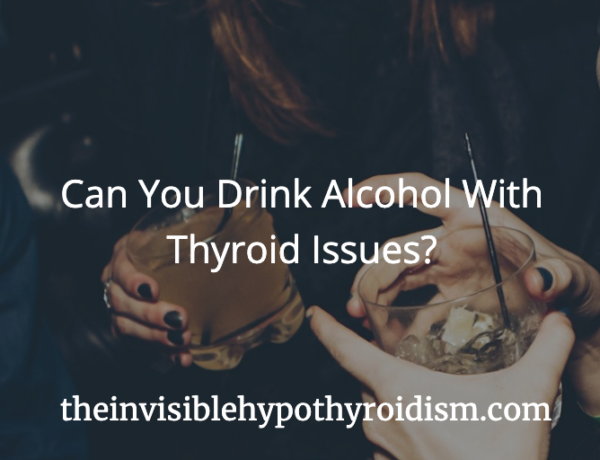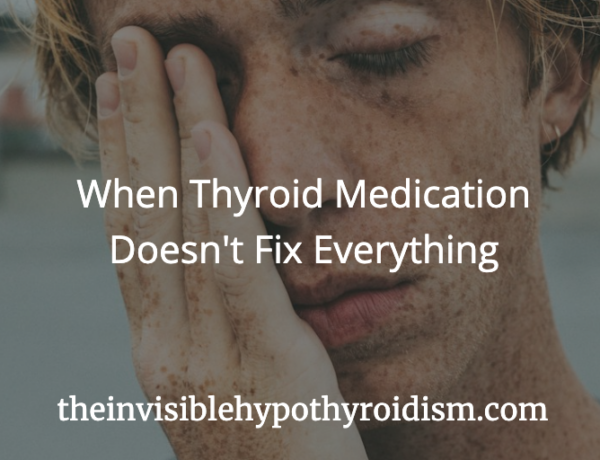Originally published on 5th June 2016 Last updated on 2nd February 2024
Many thyroid patients are on thyroid hormone replacement medication, such as Levothyroxine or Synthroid and still feel unwell. It may be due to a lack of conversion from T4 to T3.
What Do Thyroid Hormones DO?
A healthy thyroid gland produces five hormones: T1, T2, T3, T4 and Calcitonin. (although T1 and T2 are possibly made outside the thyroid gland, though this isn’t important for this article!)
Thyroid hormones are needed for every process and cell in your body, especially T3.
Although we have more T4 than T3, T3 is the most active.
T4 is about 90% of what the thyroid gland produces, with around 9% being T3 and adequate levels of both are needed to help us feel well and carry out all our usual bodily functions and processes.
When we are on T4-only medications such as Levothyroxine or Synthroid, T4 must convert to T3 to create the T3 we need to correct the hypothyroidism and feel well.
The main purpose of thyroid hormone, produced by the thyroid gland, is to ensure the metabolism is running properly. You might think that the metabolism’s job is just to burn calories, but it is also to produce heat and fuel to keep us warm and give us energy.
However, if we don’t have enough thyroid hormone (T4 and T3) , we can have a slow metabolism, with symptoms such as cold intolerance (from the lack of heat made) and extreme tiredness and weight gain (from the lack of calories burned to make energy), among lots of other symptoms of hypothyroidism.
T4 to T3 Conversion
An inability to properly convert T4 to T3 is common among thyroid patients and can even result in a fluctuating TSH, or a TSH that is ‘in range’ and a low Free T3.
Many patients have an in-range TSH, but when they check their Free T3 and Free T4 levels, they see that the T4 from their thyroid medication is not converting to adequate levels of T3.
This can be caused by an enzyme called iodothyronine deiodinase, that is deficient for some people, as they have the Deiodinase 2 (DIO2) gene variant.
The DIO2 gene was researched in 2009 and the results were published in a paper titled “Common Variation in the DIO2 Gene Predicts Baseline Psychological Well-Being and Response to Combination Thyroxine plus Triiodothyronine Therapy in Hypothyroid Patients.”
The DIO2 gene activates the active thyroid hormone T3. The researchers found that a small change in this gene could mean that thyroid patients have ongoing symptoms on T4-only medicines such as Levothyroxine.
Patients in this study were given levothyroxine (synthetic T4) only for a set period and then combination treatment of both levothyroxine and liothyronine (synthetic T3).
The patients who had normal genes did not feel any different on the combination treatment, but those who had the DIO2 gene felt better on combination treatment.
The enzyme iodothyronine deiodinase is important in the activation and deactivation of thyroid hormones, as T4 is converted into T3 by deiodinase activity. A problem with this can therefore cause conversion issues, where TSH may look ‘fine’, as well as the Free T4 level, but with a low Free T3 and continued hypothyroid symptoms and development of other health conditions (such as mental health and heart/blood pressure problems). Low or deficient levels of trace minerals selenium and zinc can also cause conversion issues.
The BBC show ‘Trust Me I’m a Doctor’ even covered this issue:
Sometimes when patients are diagnosed with hypothyroidism and prescribed T4, this doesn’t make them feel any better. It may be that these patients have trouble converting T4 into the active version of the hormone, T3. This process is dependent on enzymes in the body that need certain nutrients to function. It could be that these enzymes are not working properly, or the body isn’t producing enough of them or it could be that patients are lacking the nutrients needed for these processes, such as selenium. An alternative treatment option is to take T3 – the active hormone.
Poor gut health may also contribute to poor T4 to T3 conversion.
The gut assists in converting inactive thyroid hormone T4 to active T3 (which is what we need for energy and many functions within the body), which requires an enzyme called intestinal sulfatase.
However, this enzyme comes from healthy gut bacteria. An unhealthy gut can lead to a lack of this important enzyme.
Intestinal dysbiosis is an imbalance between pathogenic and beneficial bacteria in the gut, which can significantly reduce thyroid hormone conversion – just one reason why people with poor gut health may have thyroid symptoms but ‘normal’ TSH test results.
Symptoms of Poor T4 to T3 Conversion
Conversion problems and issues with thyroid medication properly working may be caused or influenced by adrenal dysfunction or vitamin deficiencies such as iron, zinc or selenium. Poor gut health can also be a contributor. [1]
By addressing these, you may fix or improve the conversion issue, but many other people simply have a problem converting T4 to T3 and don’t know why.
However, troubles converting thyroid hormone are a big reason as to why T3 and NDT medications can work better for a lot of thyroid patients. As opposed to T4-only medications like Levothyroxine or Synthroid, NDT or synthetic T3 medications give direct T3, so the patient doesn’t have to rely on their body to convert it.
My Switch From Levothyroxine to NDT
I was unwell on Levothyroxine and only felt worse as time went on but have reclaimed my health and life by switching to NDT medication which contains direct T3.
If you’ve tried raising your dosage of T4-only medication and feel even worse, then this could be a sign of a conversion problem, as you may not need any more T4, but instead T3.
If your doctor runs thyroid test after thyroid test and says you’re still ‘fine’, even though you feel rubbish, then it could indeed be a conversion problem. If they only test TSH and Free T4, then this would not show up a conversion problem. A low Free T3 would show insufficient amounts of T3 in the blood.
Conversion issues are a big reason why I support the option of Natural Desiccated Thyroid and T3 medication, especially when we see how incompatible T4-only medication can be for some people.
The only way to know for sure if conversion issues are holding your health back is with thorough and full thyroid testing. If your doctor won’t order the full thyroid panel (including the all-important Free T3), then you can do so quite inexpensively online. Medichecks cover the UK and LetsGetChecked covers the US.
Related Post: How to Get Natural Desiccated Thyroid or T3 Medication in the UK
Related Article: Signs Your Thyroid Medication May Need Adjusting
What Does a Conversion Problem Do?
Not being able to adequately convert T4 in to T3 can leave you hypothyroid and not optimally medicated. Your hypothyroidism isn’t optimally managed, meaning you may still have a lot of symptoms, and mental health also often suffers.
Having low Free T3 can be the cause behind depression, mood swings, anxiety etc. when on t4-only medication. This was certainly true for me. When I switched from T4-only Levothyroxine to NDT, my anxiety, depression and over-emotional tendencies lifted quickly.
T3 has an important role in the health and optimal functioning of your brain, including: your cognitive function, ability to concentrate, mood, memory and attention span and emotions and ability to cope with life’s stresses. T3 interacts with brain receptors and makes the brain more sensitive to chemicals such as Serotonin and Norepinephrine, which affects your alertness, memory, mood and emotion.
Have you been checked for conversion issues? Let me know in the comments below.
See also:
The book Be Your Own Thyroid Advocate: When You’re Sick and Tired of Being Sick and Tired, which contains helpful information like this article and so much more.
You can click on the hyperlinks in the above post to learn more and see references to information given.
References:
[1] https://wp.me/p9mrIy-2KQ

